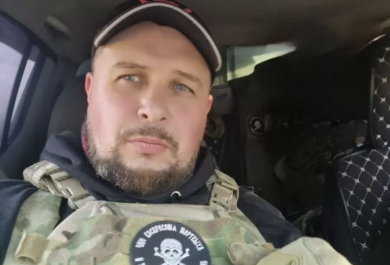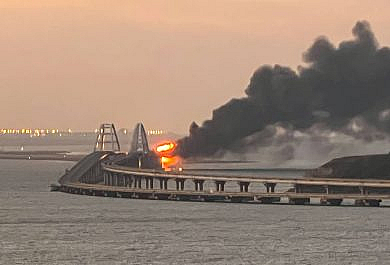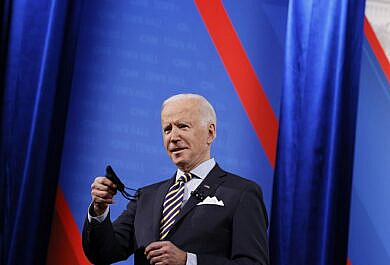Vladimir Putin deployed troops to rebel-controlled regions of eastern Ukraine Monday.
Summary
Russian military vehicles rolled into rebel-held territories of Eastern Ukraine Monday. Europe and the United States responded with sanctions as eastern Europe teeters on the brink of all-out war.
- Vladimir Putin recognized the separatist Luhansk People’s Republic (LNR) and Donetsk People’s Republic (DNR) as independent nations Monday. He immediately authorized troop deployments to the two breakaway territories in Ukraine’s Donbas region in a flagrant violation of international law and Ukrainian sovereignty
- Oil prices hit $98 per barrel, the highest level since 2014, after Putin recognized the two breakaway regions as independent. European markets declined and US futures were down as US markets were closed for Presidents’ Day.
- Ukrainian President Volodymyr Zelensky denounced Putin’s actions and ruled out making any territorial concessions to the predatory Russian Federation. Zelensky indicated that Russia’s actions sounded the death knell for the Minsk Protocol meant to stop fighting in the Donbas.
- The European Union announced sanctions targeting 362 Russian government officials involved in the decision to back recognition, banks financing Russia’s military, Russia’s ability to access EU capital and financial markets and trade to and from the two separatist enclaves.
- Germany stopped the controversial Nord Steam 2 pipeline designed to double Germany’s intake of Russian gas through the Baltic Sea. The Biden administration had previously lobbied Senate Democrats to kill sanctions on this pipeline to appease Germany.
- The United Kingdom sanctioned five Russian banks and three Russian billionaires. Biden issued limited sanctions merely aimed at the two breakaway regions but none targeting Russia itself.
![]()
- The New York Times provided a useful explainer on Ukrainian history after Putin delivered a rambling, angry speech to the Russian people deriding Ukrainian independence as a “myth” and a creation of the Bolsheviks. Putin’s speech was reminiscent of the old Soviet joke, “The future is certain, it’s the past which is unpredictable.”
- The Washington Post covered the Biden Administration’s hesitation over the “i-word:” invasion. Biden previously said any Russian attempts to “further invade Ukraine” would be met with punishing sanctions. Russian troops are now in sovereign Ukrainian territory, yet the “swift and firm response” is nowhere to be found.
- CNN reported on China’s reaction to Russia’s move on Ukraine. China called for “restraint” but avoided either fully condemning Russia or fully supporting Putin’s actions. China is playing a difficult diplomatic game where it is trying to grow closer to Russia without attracting blowback from the West.
![]()
- The Wall Street Journal assessed “Putin’s endgame:” to end the post-Cold War consensus that he believes “humiliated Russia.” Putin called the collapse of the Soviet Union the “greatest geopolitical catastrophe” of the 20th Century – greater than either World War or the Holocaust, apparently.
- National Review called Putin’s rant “the most dangerous speech of the post-Cold War era,” said the speech “should make one question Putin’s sanity” and predicted this will only end in disaster.
- Ruthless Podcast ripped Kamala Harris’s performance at the Munich Security Conference over the weekend and her “inability to answer simple Ukraine questions.”Author’s Take
Special Agent Leroy Jethro Gibbs, the main character of CBS’s long-running police procedural NCIS, has a set of rules for life. Gibbs’s Rule #39 is relevant today: There is no such thing as a coincidence. Vladimir Putin has now attacked Ukraine during two consecutive Democratic presidencies. In 2014, he annexed Crimea and initiated the war in Eastern Ukraine between the Ukrainian government and Russian-backed separatists. In 2022 he recognized the separatists and sent Russian troops into Ukrainian territory for the first time.
If one includes Russia’s invasion of Georgia in 2008, Putin has now invaded a neighbor during three of the last four presidencies. Donald Trump’s presidency was the lone exception. It’s hard to argue with Rich Lowry’s argument that Trump’s “sheer unpredictability” made Putin wary of trying anything on his watch. Trump’s at-times erratic behavior, his flashes of anger and blustery threats (remember “fire and fury?”) and his penchant for taking bold, violent action (e.g., the airstrike that killed Iranian general Qassem Soleimani) may have made Putin hesitate. Biden, by contrast, is a normal, conventional, predictable president, just like Barack Obama.
During the 2012 presidential debates, Barack Obama infamously mocked Mitt Romney’s prescient warnings about Russian aggression with the sneering slogan, “the 1980s are now calling to ask for their foreign policy back because the Cold War’s been over for 20 years.” Russia took Crimea less than 2 years later. Now Obama’s understudy is back in power, and the Russian military is on the move once again. There’s no such thing as a coincidence.
© Dominic Moore, 2022





